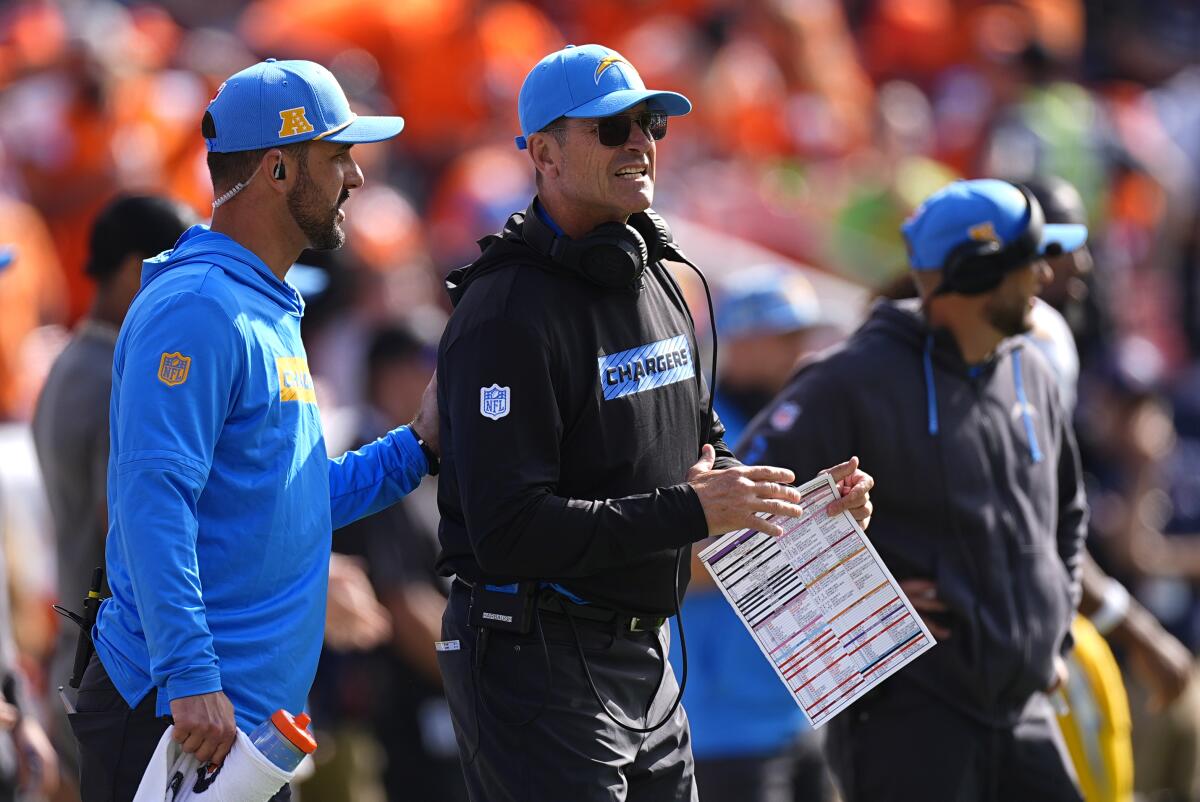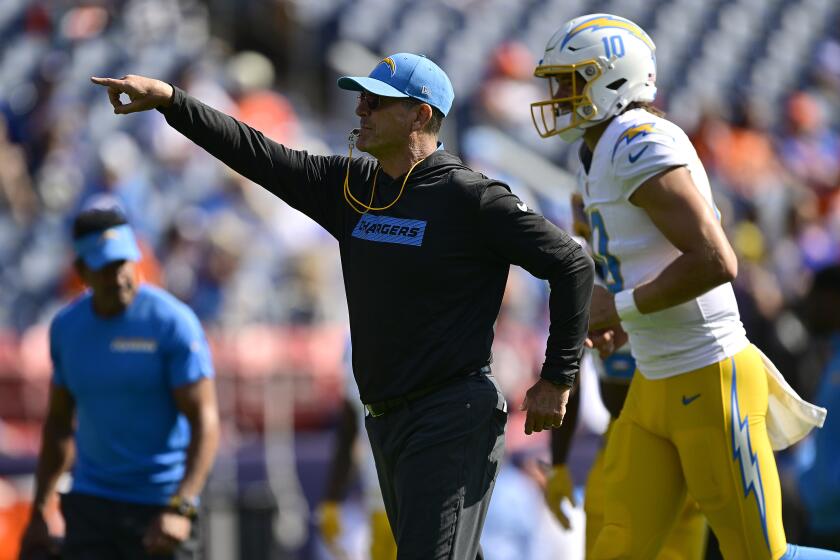Chargers coach Jim Harbaugh has had this heart issue before, but what are next steps?

- Share via
DENVER — The setting was different, but for Jim Harbaugh the feeling was hauntingly familiar.
It began the night before Sunday’s Chargers game against the Denver Broncos, when an irregular heartbeat — an issue he dealt with in 1999 and 2012 — caused him discomfort. He informed at least some of his players, telling them he was simply excited about the game.
But the arrhythmia — diagnosed as an atrial flutter — resurfaced in more dramatic fashion during pregame warmups, prompting him to briefly duck into the blue medical tent on the sideline then head for the locker room flanked by team medical personnel.
There’s so much activity happening on an NFL sideline that many of the players had no idea that defensive coordinator Jesse Minter had taken over head-coaching duties in Harbaugh’s absence.
Meanwhile, in the visitors’ locker room, paramedics were measuring the electrical activity of Harbaugh’s heart by administering an electrocardiogram. Marco Zucconi, Chargers director of player health, wellness and performance, gave the coach an IV and magnesium to treat his condition.
Chargers’ coach Jim Harbaugh had to leave the game early because of an apparent illness but he and his team recovered in Denver to beat the Broncos, 23-16.
“It’s the heart,” Harbaugh said after the 23-16 victory, “so you take it seriously.”
Within minutes, his heart had returned to a normal rhythm and he returned to the game, walking back down the sideline and collecting the red challenge flag from Minter, who had been defensive coordinator on Harbaugh’s University of Michigan staff.
After his two previous episodes of atrial flutter, Harbaugh underwent ablations, which are minimally invasive procedures that treat irregular heartbeats by destroying heart tissue that causes abnormal electrical signals.
Thirteen years passed between his first and second ablations, and the second was 12 years ago.
“I figured I was getting close to the 13-year mark and I was going to need another one,” he said.

Harbaugh looked tired in the wake of the victory, but otherwise normal. He’s trim and works out with his players, looking younger than his 60 years, but leaned over and put his hands on his knees before walking to the team bus, ostensibly to catch his breath.
He said he didn’t know whether the altitude in the Mile High City exacerbated his ailment.
CBS showed video of Harbaugh walking off and back onto the field, but the reason wasn’t publicly known until the coach disclosed it in his postgame news conference. His family knew, though, as his older brother, John, coach of the Baltimore Ravens, cut short his news conference after four questions so he could get information on his brother.
Chargers general manager Joe Hortiz, who came from the Ravens, called Eric DeCosta, his Baltimore counterpart, and apprised him of the situation. Chad Steele, who runs media relations for the Ravens, then cut short John Harbaugh’s comments from the lectern.
John, in turn, called his parents, Jack and Jackie Harbaugh, in Ann Arbor, Mich. By that time, he got word that his younger brother had been cleared to return to the sideline.
Matt Holtry had no inside knowledge or crystal ball when he made the decision.
“From a concerning standpoint, any time people have these types of rhythms their heart rates kind of spike up,” said Dr. Nikhil Warrier, medical director of electrophysiology at MemorialCare Heart & Vascular Institute at Orange Coast Medical Center in Fountain Valley.
“They can be sitting around doing nothing and all of a sudden their heart rates go up to 130, 140, 150 beats per minute and that’s unusual for anyone.”
Warrier said there are an array of factors that can lead to the condition, including excessive stress and caffeine consumption, as well as structural issues of the heart.
“Oftentimes we see patients have no other risk factors other than the fact that they showed up and have this arrhythmia,” he said. “In that case it is curable from the ablation. So that ends up being the most common strategy that we employ.”
Harbaugh was playing quarterback for the Chargers when he first experienced atrial flutter. The second episode came when he was coaching the San Francisco 49ers during a Monday night game against the Chicago Bears.
The first time, he missed a day or two of practice. The second time, in addition to an ablation, he underwent an electrical cardioversion, in which paddles that supply an electrical current are used to reset the heart’s rhythm back to a regular pattern.
He said after Sunday’s game that he planned to see a cardiologist Monday.
“Trust the doctors,” he said. “If you’re not going to trust your doctors, who are you going to trust?”
More to Read
Go beyond the scoreboard
Get the latest on L.A.'s teams in the daily Sports Report newsletter.
You may occasionally receive promotional content from the Los Angeles Times.









